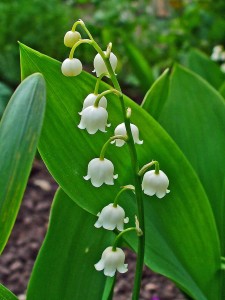Lily of the valley, sometimes written lily-of-the-valley, scientific name Convallaria majalis /ˌkɒnvəˈlɛəriə məˈdʒeɪlɨs/, is a sweetly scented, highly poisonous woodland flowering plant that is native throughout the cool temperate Northern Hemisphere in Asia, and Europe.
Contents
Uses
Lily-of-the-valley is used for heart problems including heart failure and irregular heartbeat. It is also used for urinary tract infections (UTIs), kidney stones, weak contractions in labor, epilepsy, fluid retention (edema), strokes and resulting paralysis, eye infections (conjunctivitis), and leprosy.
Store lily-of-the-valley in well-sealed containers and protect from light.
Benefits
The effect of the whole plant is more gradual in comparison to isolated digitalis glycosides, producing effective results with a smaller dose. The active cardiac glycosides in the lily of the valley are released consecutively, and do not pose a toxic problem to the kidneys, which excrete them easily. The plant’s flavonoids stimulate the arteries to dilate and simultaneously, the asparagin acts as a diuretic, making it a good herb for high blood pressure.
In treating heart disease, lily of the valley is often combined with motherwort (Leonurus cardicia), moonlit cacti (Selenicereus) and hawthorn (Crataegus oxyacantha).
An ointment made from the plant roots has been used to treat burn d prevent scar tissue.
In aromatherapy, the essential oil of lily of the valley is used to relieve depression, imbue gentleness, happiness, modesty, a sweet disposition and sense of security.
Lily of the valley is associated with the planet Mercury. During medieval times a poultice of the herb combined with lavender and peppercorns was applied to the forehead and back of the neck as a treatment for brain illnesses such as melancholy, depression, epilepsy, and stroke to restore mental balance.
The herb has been used for weak contractions during childbirth as well as for epileptic seizures, strokes, angina and ensuing paralysis, conjunctivitis and leprosy.
Lily of the valley has been recommended for strengthening the brain and rejuvenating a weak memory.
Cautions
Lily-of-the-valley might be safe for most people when used under proper medical supervision. But, it is UNSAFE when used for self-medication. Since lily-of-the-valley can affect the heart and other systems, the dose must be carefully chosen and side effects checked by a healthcare professional. If you swallow lily-of-the-valley accidentally, get medical treatment right away. Lily-of-the-valley can cause side effects such as nausea, vomiting, abnormal heart rhythm, headache, decreased consciousness and responsiveness, and visual color disturbances.
Special Precautions & Warnings:
Pregnancy and breast-feeding: Don’t self-medicate with lily-of-the-valley if you are pregnant. It is UNSAFE to use unless you are under close medical supervision.
Heart disease: Don’t self-medicate with lily-of-the-valley if you have heart disease. It is UNSAFE to use unless you are under close medical supervision.
Low levels of potassium (potassium deficiency): Don’t use lily-of-the valley if you are potassium deficient. Lily-of-the-valley contains chemicals called cardiac glycosides that can cause the body to lose potassium. This could make potassium deficiency worse. If your potassium level gets low enough, it can harm the heart.
Interactions
- Calcium supplements interacts with LILY-OF-THE-VALLEY
Lily-of-the-valley can stimulate the heart. Calcium might also affect the heart. Taking lily-of-the-valley along with calcium might cause the heart to be too stimulated. Do not take lily-of-the-valley along with calcium supplements. - Digoxin (Lanoxin) interacts with LILY-OF-THE-VALLEY
Digoxin (Lanoxin) helps the heart beat more strongly. Lily-of-the-valley also seems to affect the heart. Taking lily-of-the-valley along with digoxin can increase the effects of digoxin and increase the risk of side effects. Do not take lily-of-the-valley if you are taking digoxin (Lanoxin) without talking to your healthcare professional. - Medications for inflammation (Corticosteroids) interacts with LILY-OF-THE-VALLEY
Lily-of-the-valley might affect the heart. Some medications for inflammation can decrease potassium in the body. Low potassium levels can also affect the heart and increase the risk of side effects from lily-of-the-valley.
Some medications for inflammation include dexamethasone (Decadron), hydrocortisone (Cortef), methylprednisolone (Medrol), prednisone (Deltasone), and others. - Quinine interacts with LILY-OF-THE-VALLEY
Lily-of-the-valley can affect the heart. Quinine can also affect the heart. Taking quinine along with lily-of-the-valley might cause serious heart problems.
- Antibiotics (Macrolide antibiotics) interacts with LILY-OF-THE-VALLEY
Lily-of-the-valley can affect the heart. Some antibiotics might increase how much lily-of-the-valley the body absorbs. Taking lily-of-the-valley along with some antibiotics might increase the effects and side effects of lily-of-the-valley.
Some antibiotics called macrolide antibiotics include erythromycin, azithromycin, and clarithromycin. - Antibiotics (Tetracycline antibiotics) interacts with LILY-OF-THE-VALLEY
Taking some antibiotics called tetracycline antibiotics along with lily-of-the-valley might increase the chance of side effects from lily-of-the-valley.
Some tetracycline antibiotics include demeclocycline (Declomycin), minocycline (Minocin), and tetracycline (Achromycin). - Lithium interacts with LILY-OF-THE-VALLEY
Lily-of-the-valley might have an effect like a water pill or “diuretic.” Taking lily-of-the-valley might decrease how well the body gets rid of lithium. This could increase how much lithium is in the body and result in serious side effects. Talk with your healthcare provider before using this product if you are taking lithium. Your lithium dose might need to be changed. - Stimulant laxatives interacts with LILY-OF-THE-VALLEY
Lily-of-the-valley can affect the heart. The heart uses potassium. Laxatives called stimulant laxatives can decrease potassium levels in the body. Low potassium levels can increase the chance of side effects from lily-of-the-valley.
Some stimulant laxatives include bisacodyl (Correctol, Dulcolax), cascara, castor oil (Purge), senna (Senokot), and others. - Water pills (Diuretic drugs) interacts with LILY-OF-THE-VALLEY
Lily-of-the-valley might affect the heart. “Water pills” can decrease potassium in the body. Low potassium levels can also affect the heart and increase the risk of side effects from lily-of-the-valley.
Some “water pills” that can deplete potassium include chlorothiazide (Diuril), chlorthalidone (Thalitone), furosemide (Lasix), hydrochlorothiazide (HCTZ, HydroDiuril, Microzide), and others.
Other names
Clochette des Bois, Constancy, Convallaria, Convallaria Herba, Convallaria majalis, Convall-Lily, Gazon de Parnasse, Jacob’s Ladder, Ladder-To-Heaven, Lily, Lirio de los Valles, Lis des Vallées, Lys des Vallées, May Bells, May Lily, Muguet, Muguet de Mai, Muguet des Bois, Our Lady’s Tears
References
Source: Wikipedia, https://en.wikipedia.org/wiki/Lily_of_the_valley
Herbal Supplement, http://www.herbal-supplement-resource.com/lily-of-the-valley.html

